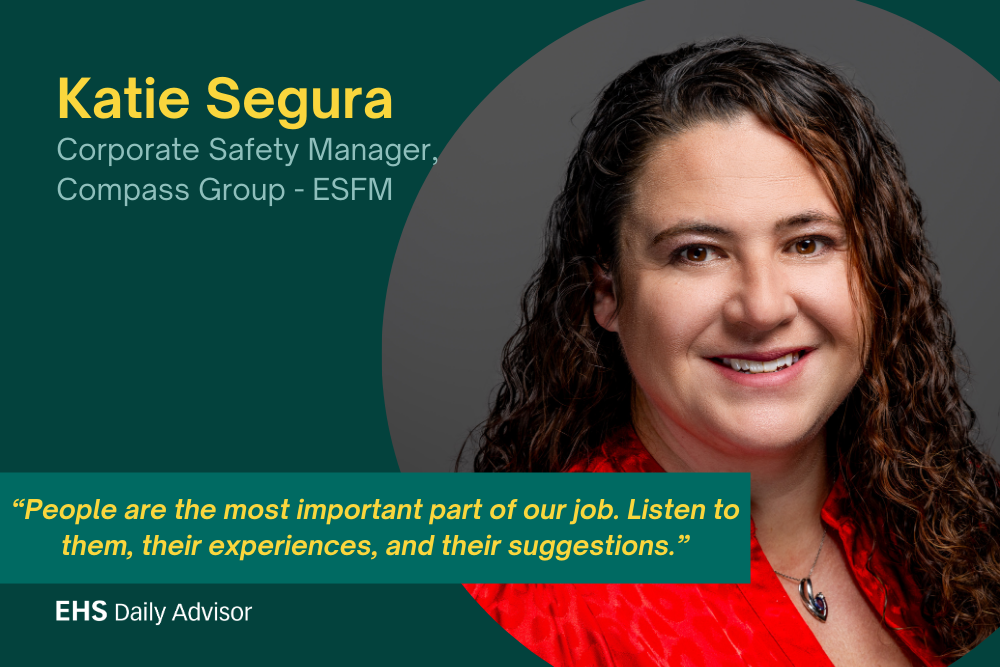If a tree falls in a forest and no one is around to hear it, does it still make a sound? If a worker suggests safety measures and an EHS professional doesn’t bother listening, does the organization still have an effective workplace safety program?
Katie Segura might not be able to answer the classic tree question, but she strongly believes in the need to listen to everyone’s input on safety.
Segura works as the corporate safety manager at Compass Group dedicated to its ESFM division, which provides integrated facilities management to clients across several industries. Her main duties include supporting a safety committee, helping implement corporate and ESFM safety procedures, assisting managers with workers’ compensation claims, and ensuring corrective actions are implemented after injuries.
Segura has been in the EHS industry for over 20 years. Before joining Compass Group – ESFM eight years ago, she held various safety and industrial hygiene positions in chemical plants, medical device manufacturing, and facilities management. She has a master’s degree in environmental science, specializing in industrial hygiene and safety.
To learn more about Segura and her take on industry issues, please read the Faces of EHS interview below:
Q: How did you get your start in the field?
The summer before college, I worked as an intern in the safety and environmental department at utility CenterPoint Energy. It was during this time that I developed a passion to help people and the environment. I job-shadowed CenterPoint associates and gained insight as to how I could ensure people go home safely to their families. I also performed water and soil sampling.
Q. Who has been your biggest influence in the industry?
Each person I meet in the industry, not only EHS professionals, is an influence on me. I hear personal stories of how people got hurt, which have influenced how I train others. I hear how EHS professionals have handled situations, which influences how I handle my next incident.
Q: What’s your favorite and least favorite part about working in the industry? Would you change anything?
At ESFM, safety is a top priority at every level of management. I feel supported and empowered to implement safety procedures as I see fit.
My favorite part about being an EHS professional is how I can help others be safe and go home to their families. On the flip side, there are some people who just do not want to listen and want to do the job as quickly as possible. For those people, I just have to be there and try to positively influence their decisions.
Q: What are your thoughts on safety culture? How can company leaders make safety a value within their organization?
Safety is everyone’s responsibility. We cannot have a good safety culture without everyone’s buy-in. Even though I have a safety title, I cannot drive safety within the organization by myself. Company leaders can make safety a value in their organization by ensuring frontline supervisors value safety. Associates will often listen to their supervisors and mirror the same values their supervisors have.
Q: How will new safety technologies influence the work being done by EHS professionals?
Safety technology can make our jobs easier because that is just what technology does! However, we still need to evaluate it. Does the latest and greatest thing actually make the job safer? Does the product do what it is claims? What does the person who is performing the job think about it? If they do not like it, they will not use it. Then you risk the person getting hurt because they are not using anything.
Q: Do you have any advice for people entering the EHS profession?
People are the most important part of our job. Listen to them, their experiences, and their suggestions. They have done their job, sometimes longer than you have been alive. Sometimes, the people who do the job have better ideas on how to do it safer than you. Listen to them.
Are you or a colleague an EHS professional interested in being profiled for the Faces of EHS series? Please contact Joe Bebon at JBebon@BLR.com.


